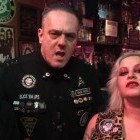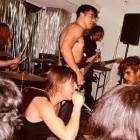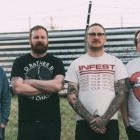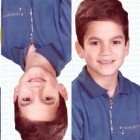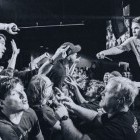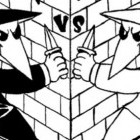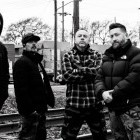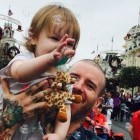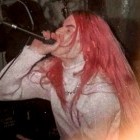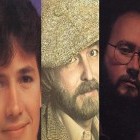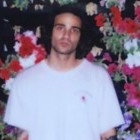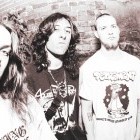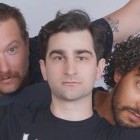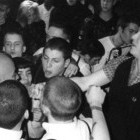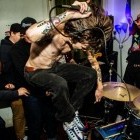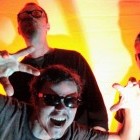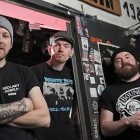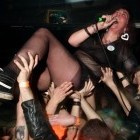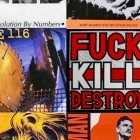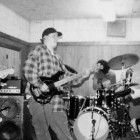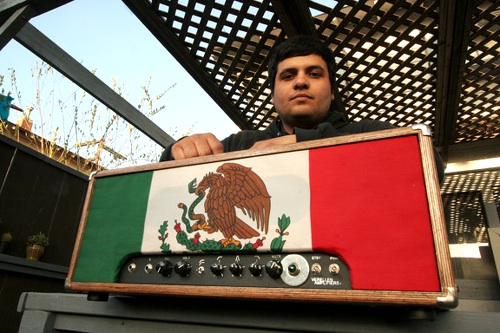
Back in 1994, I was in college and listening to a lot of Matthew Sweet and the Raspberries. At that point, I wasn't too up on the hardcore scene, with the exception of a few bands (hello, Bulldoze and Neglect!), but that year an album by a San Diego band called Unbroken got my attention. Life. Love. Regret. was the group's sophomore album, and its metallic riffing and reflective lyrics resonated with me. I wasn't alone. Soon after the record was released, a new wave of like-minded hardcore bands began surfacing throughout the world.
Since discovering Unbroken, I've kept up with the career of the group's bassist, a fellow Britpop obsessive named Rob Moran. Since Unbroken's breakup in the mid-'90s, Moran has played in the bands Kill Holiday, Over My Dead Body, The Vows, Some Girls, and currently holds down the bottom-end for Deathwish Inc. act, Narrows. Outside of his work as a musician, the San Diegan opened Heartwork Coffee Bar, a shop in the Mission Hills neighborhood of his hometown. I had the chance to visit the store a few months back with a co-worker who is a huge coffee snob, and he walked away with a huge smile on his face. I guess Moran knows his coffee as well as he knows hardcore!
Today, I chat with Moran about his upbringing, his various musical adventures, and the road that led him to becoming an entrepreneur.
Anyone who's familiar with you throughout the years knows how proud you are of your Mexican heritage. As a fellow Latino American, I'm really interested in hearing about your upbringing.
I come from a working-class family. My mom was a cashier at a grocery store and my dad did construction work. I also have a younger brother with whom I am very close. Things were not easy for us growing up, but my parents did the best they could. With inconsistent work and incomes that barely kept us afloat, my parents gave my brother and I an incredible childhood. One thing that was a constant in our home was music and food. My parents were always cooking something, while listening to records by various artists like Janis Joplin, War, Boston, The Who, The Kinks, and Cruz Lizárraga, who was a family relative. I had a pretty cool introduction to music because of them, and my family as a whole.
Did you get to visit your family in Mexico as a kid?
I've gone to various parts of Mexico with my family more times than I can count. Growing up, we would go to Tijuana (eight miles from our house) a few times a month to get pan dulce, tortillas, and/or visit family. Trips down the Baja coast or flights to Recodo (the town my dad is from) were pretty frequent as well. Also, I was lucky enough to see my great grandmother a few times at the ranch my dad grew up on. If anything, these trips helped my brother and I to see where we came from and have a sense of identity and family history.
SEE ALSO: The Hispanic Impact on the Early New York Hardcore Scene
That's amazing. Turning to music, outside of hardcore, you're also known for your deep love for British bands like The Smiths and Suede. It's much different now, but did you find it tough to find kids like you in the '80s that embraced such disparate musical styles?
As I had mentioned in the article about Suede, I grew up obsessed with music. The Mighty 690 radio station, along with my parents' encouragement by buying me records for good report cards, helped start my path to loving music. I got music magazines of all types that further fueled my obsession with music. Adam Ant, Def Leppard, and David Bowie were the artists I liked most, and would start my path to loving British music. Growing up, you didn't notice much difference amongst our group of friends. We were all just working-class kids that were raised on the radio. In the mid-'80s, my parents split up and my brother and I moved in with my mom. We were in a super rough part of town, but since we were into skateboards and music, we didn't get wrapped up in gang life. A lot of our friends did, and many of them are in jail or worse, but through music we avoided that life. We ended up just doing our own thing and slowly made friends with like-minded kids in the neighborhood.
I was with this girl who was a couple years older than me and while in her car, The Smiths' "What Difference Does it Make?" came on and I was spellbound. The next day I begged my mom for some money to buy a record and she took me to Licorice Pizza Records, where the clerk handed me Strangeways, Here We Come by The Smiths, as it was their latest and final album. I sat and stared at the cover wondering what "Strangeways" was or what it meant. I looked at the cover and was in love with the soft face and layout. The lyrics made no sense to me, but spoke of love, comatose girlfriends, and dead music stars. I was knee-deep in punk at this point, so bands like Circle Jerks and The Damned had much different topical lyrics than The Smiths. All I knew was that I loved what I was hearing, and I never stopped enjoying this type of music.
Can you give me a summarized version on how Unbroken first got together?
I met Eric Allen and Todd Beattie at an Earth Day event the day Judge was playing at a friend's garage in Chula Vista in 1990. A mutual friend, Angela, introduced us. A year later, they had a band going and needed a bass player, and I had picked up the bass a year or two prior to meeting them. They asked me to join and we started playing as a four-piece. Steven Andrew Miller came along about a year or so later, and Unbroken started. Dave was living in San Diego, by way of St. Louis, and would come around to our shows now and again. When the previous singer left, we asked Dave Claibourn to join, and that lineup remained to the end.
How old were you at that point?
Everyone was between the ages of 16 to 19 when the band put out our first 7".
Thinking back to those early Unbroken records, did you guys have a clear vision of what you wanted to get across on the musical front?
We just loved Integrity, Judge, and Insted, and we tried to emulate those sounds, as we had zero direction, really. It wasn't until listening to bands like Entombed that we figured out dropped tuning. Eric and Steve did an incredible job of merging these genres of music together. All the music from Life. Love. Regret. onward was created by them with the intention of being as brutal as possible, but not to be a metal band or just a regular hardcore band. They came up with incredible sounds pretty quickly, and by the time Ritual was released, we were well past those songs.
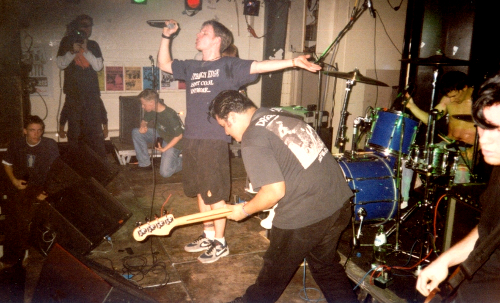
Speaking of Ritual, I remember first hearing about the band after that came out in 1993. I was a senior in high school and looking for some new hardcore bands to check out since I kind of lost touch with what was happening in that scene. Listening back to the album today, it's got more of a NYHC type of feel to it than what came later.
I think the Ritual album does not hold up in any way. I feel it is contrived hardcore, and why hardcore was a bit dull from 1990 to 1993. It feels like lost teenagers throwing every cliché out there. There are moments of it that I enjoy, but as a whole, it's a shitty record.
Your second album, Life. Love. Regret., only came out a year after Ritual did, but I think it shows a huge progression in terms of the songwriting and performances. There's a strong sense of dynamic interplay within the arrangements, and Dave's vocals have a lot more character to them.
I absolutely agree. Ritual took a long time to be released, and by the time it was, five songs for Life. Love. Regret. were already completed and we just wanted to move on. Ritual felt like the terrible high school photo you don't want people to see, while this album felt very special. We were all going through terrible moments in one way or another, and the vibe of the record was real. We were depressed, angry, hurt, and had no idea what to do with our lives. All of it helped fuel the lyrics, the songwriting, and the layout. In a sense, it felt cathartic to record the album. Dave had better music to work with, and I think it really pushed him to challenge his voice and kick things up a notch.
I'm happy with everything about the record. Even the sloppy bass and drum parts, or out-of-tune guitar parts. It just sounds like how we did live. We were never a tight band and that album captures that spirit.
Do you remember what the reaction was to Life. Love. Regret. when it first came out? Did people within your scene immediately accept it? I lived in NYC at that time, and the album definitely resonated with some people I knew there when it came out.
It seemed to be somewhat polarizing. People either got it or hated it. There didn't seem to be a middleground for it. Maximumrocknroll fired someone for reviewing the album, as they considered it "metal" and not a punk record, and wouldn't allow Mike Hartsfield [owner of New Age Records] to place ads for the record. It was weird to me that a magazine I read for years would ban an album I was involved with. That aside, the people that understood what we were doing seemed to really embrace everything: our music, our influences, our live shows. It was a small group around the world, but it was beautiful.
SEE ALSO: 2015 interview with Kyle Bishop (Grade, Acrid, The Black Maria, The Swarm).
Why did Unbroken decide to break up in 1995? It has fed into the mythology of the band, but as fan of metallic hardcore, I wonder what you guys could have put together on album #3.
In the end, Unbroken was about to turn into a rock 'n' roll band. The Drive Like Jehu/Rocket From the Crypt/Jawbreaker influences were starting to creep into our sound more and more. While in Europe, we had decided that we would end it in late '95. We knew that if we continued, we would lose what we created and that we would have been a very different-sounding band. We had practice recordings of three of the four new songs, one of them was released as an extra track on the boxed set. We only ever played it live twice and it was found on a recording from a video. It was okay at best, and the better of the last four songs Eric and Steve wrote, but I think ending it was the best decision.
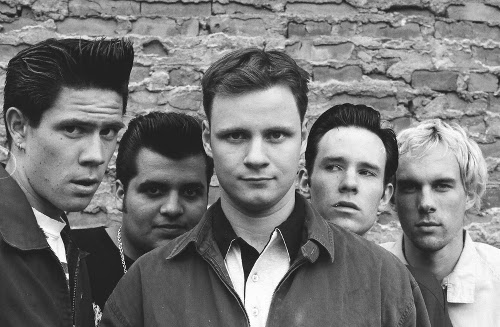
What was your headspace like after Unbroken broke up?
I felt lost and was not sure what to do. I was 23, no school, no career. Thankfully, I knew how to silkscreen and Mike at New Age needed someone, so I moved to Orange County, California for a few years. I was just in a haze of trying to figure out what to do with myself. I felt so drained after Unbroken, I didn't feel like playing music or anything. I ended up working at Revelation Records and rebooted Crisis Records, and signed a few bands [Will Haven and Shai Hulud, among others] and had a great time. I ended up moving back to San Diego and working at a record shop for a while. It was an odd few lost years.
During your time in Unbroken's first run, you and one of the band's guitarists, Steven Andrew Miller, formed Kill Holiday.
Steve and I had talked about doing something indie-sounding and completely different than what we had played before. Barry Kellman [drummer from Amenity and House of Suffering] was Unbroken's roadie while we were in Europe. We asked him to play drums in the band along with our friend Oscar Paz, who was in a great band called Impel. Kill Holiday pretty much formed from there. I left before the EP even came out. I liked it, but didn't love it, and decided that my interests laid elsewhere and parted on good terms. I wish I played on that Revelation Records album [1999's Somewhere Between the Wrong is Right], it's such a great record.
One of Unbroken's guitarists, Eric Allen, committed suicide a few years after the band broke up. Was that the first time you had someone so close to you pass away? How did you personally deal with it?
No, it was not the first time. A friend of mine, Glen, died of similar circumstances in the early '90s. It was a sad time that I prefer not to dwell on, but it wasn't easy to deal with and it's something I hope nobody has to go through. I just went further into the musical rabbit hole and read a lot, too. I wasn't equipped to deal with the loss of my friend, the music and books provided me comfort.
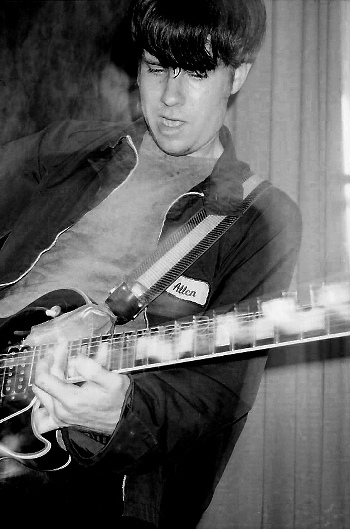
After Unbroken you played in a hardcore band called Over My Dead Body.
Over My Dead Body was already started up and they needed a bass player. My friends Daniel, Aaron, and Tommy reached out and I felt like playing back to basics hardcore like Gorilla Biscuits and Turning Point. It was really fun to play that type of hardcore. I'd never been in a band like that, so it was interesting. We did a few tours and put out a few records. I ended up meeting some great people through the band and had a great time.
What were you doing for a living at that point?
I was working for a credit card company doing fraud management. I had finally found a career that I love (I still do this same line of work) and it allowed me to tour when I wanted.
SEE ALSO: 12 Newer Hardcore Bands to Check Out in 2016
At some point you moved away from San Diego to Seattle and played in The Vows, along with guys who had played in Undertow, Champion, and a couple of other bands. I think people slept hard on that 7"!
Ryan Murphy and John Pettibone from Undertow and I had been friends since we were kids, as our bands played a lot together over the years. I would hang out with them from time to time while living there and we decided to play together. Sick of it All and Judge were two bands that really inspired the songwriting. Aram and Chris we knew through shows and bands as well, and we pulled them into the recording. We went in and recorded the four songs in one day. It was an absolute blast. We got to play a handful of shows. I wish we could have done more, but we were all so busy, we never had enough time to write more songs. It never really caught on, but it's a great record and holds up, I think.
Some Girls was a band that also counted Justin Pearson (Retox, The Locust) and Wes Eisold (Cold Cave, American Nightmare) as members. Looking at your discography, the stuff you did with Some Girls seems to be the most "out there," musically speaking.
Some Girls started while American Nightmare and Over My Dead Body were on tour together. Wes and I had become friends from playing a show out east in 2000/2001. During the tour, we discussed starting a band after the tour was done, since he had a few days to kill in San Diego. We went into a studio with [drummer] Sal [Gallegos III] for hours on end. Wes sat in the corner writing lyrics and listening to me work out riff after riff. Towards the end, it started to click and I came up with the demo songs and we recorded the music that night, and Wes did vocals the next day. We were really happy to play something that had an old San Diego vibe to it. Also, it sounded like nothing that any of us were involved with. We recorded the first 7" with me playing bass and guitar, Sal on drums and working the mixing board, and Wes on vocals. It was so much fun. It might be one of my favorite records I ever recorded. For the second 7", we drafted Justin to play bass and Chris Sprague from Tristeza on second guitar. We recorded another 7" and did some light touring. Chris had to leave and we brought in Chuck Rowell from Crocodiles/Plot to Blow Up the Eiffel Tower. All future studio recordings were with this lineup.
It was a very creative and fun time for the band. Wes stayed in San Diego for a few years before moving back east, but we recorded some XO Skeletons stuff before he moved, and that was really out there. They were absolute great times and I miss this band a lot. I can't speak for Wes' lyrics as they are his to speak to, but as far as the music, Chuck and I wrote most of it and we felt it like it was an unconscious revival of bands like Heroin, Antioch Arrow, and Swing Kids.
Why did you leave Some Girls?
In 2005, my job in San Diego was moving to Dallas and I just couldn't imagine living in Texas. I got offered a great job in Seattle, so my ex-wife and I decided to move up there. I moved the day after finishing my guitar tracks on Heaven's Pregnant Teens. My job was really demanding at first, and Some Girls wanted to tour more full-time and I couldn't commit to it. I had to leave the band, and Nathan from Hot Nerdz took my place. I got to play with the band when they passed through Seattle and that was great, but I never got to play or record with them again.
After Some Girls, you helped form Narrows, a band that also features Ryan Frederiksen (These Arms are Snakes), Dave Verellen (Botch), Jodie Cox, and Sam Stothers. Now, with Narrows, there's a geographical issue where some of the members of the group live in Seattle and some live in Southern California.
I'm a massive Botch fan, and Dave and I lived a few blocks from each other. We would always hang out when I first moved to Seattle, and decided to start Narrows. Ryan and I had known each other for years as well. Jodie I met in 2004, as he did the UK shows for Some Girls, and we kept in touch over the years. Jodie was coming to visit friends in Seattle, so we decided to create a band. Sam and I had known each other since '93 while living in San Diego, so we wrote the first three songs and Dave's younger brother, Ben, recorded us. After that, it was very hard to write music, but the internet allowed us to send song ideas back and forth. Once we felt we had enough loose ideas, we would pick a time, practice for three or four days to put the songs together, and then record them. It is really taxing on your psyche to pull something like that off and be proud of it. I like every record we've recorded, some more than others, but I cherish something about every recording. We are currently emailing song ideas around and with the hope of putting out another EP soon.
Speaking of Narrows, Sam from the band is also part of your newest endeavor, Heartwork Coffee Bar, a San Diego coffee spot I recently had the pleasure of visiting. Forming a band is one thing, but opening a business must be on another level, right?
Yes, Sam, along with my wife, Kim, my brother, Atilano, and his wife, Valeria, are also partners in Heartwork. Sam's wife, Chrissy, is a super talented pastry chef and handles our baked goods, as well as being involved in the shop. I am thankful for each of them and what they bring to the table. Thank you so much for being able to come by and visit the shop.
While a band and a shop are two different things, the mechanics are the same. There are personalities that differ, ideas that differ, but if you really come at it with love and respect, great things happen when you collaborate. I looked at this like another band, and instead of music, we are crafting flavors and an experience. We want everyone to feel welcomed and enjoy what we've created. We have a super talented group of employees, and every single one of them cares about what we do. While there is an insane amount of time and effort involved on a daily basis, it is a longtime passion of mine and I love being involved in something so creative and fun.
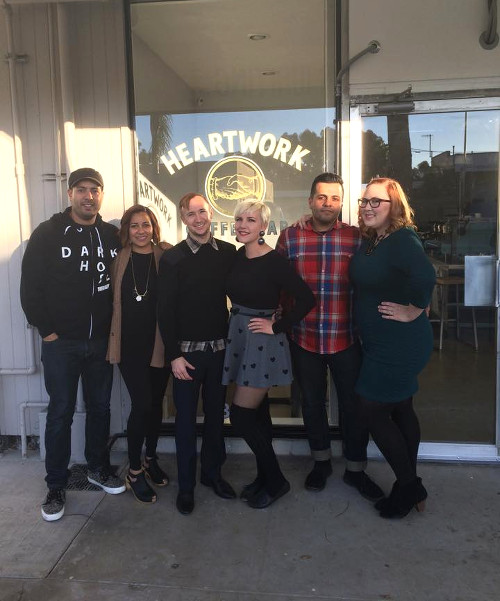
When interviewing musicians, you tend to ask them about their influences. Who or what helped influence your love for coffee?
I'm straight edge and had always had a love for coffee and tea, as I don't drink. San Diego had some independent shops that I used to go to when I was younger, but the coffee was never anything to shout about. They all had a pretty consistent dark/acidic profile no matter where you went, but while touring in bands I got to experience coffee all over the place. What changed me forever was having Vivace in Seattle in the late '90s. I was so blown away by the espresso and the quality. I nerded out with the guy about coffee and learned about roasting profiles and how coffee is served. I was super sad, though, as I was not able to have that type of coffee in San Diego until years later.
Fast-forward a few years, Sam and I were living in Seattle and enjoying coffee all over the city, and in 2005-ish, we spoke often about one day opening a shop together. It wouldn't be until almost 10 years later that we had the money, time, and a location to do it. Along with our significant others, we then made the plunge. Dave Kennedy (Over My Dead Body, Angels & Airwaves) and his brother, Jacob, started a coffee company in San Diego called James Coffee Co., so we've worked closely with them to craft our espresso flavors and training. RJ from Timeless Coffee in Oakland was also helpful with information, along with my friend, Dave, in Leeds, UK with Laynes Espresso. Much like "the scene," you find your friends and it's all hardcore kids helping each other out. Those are the types of people we've chosen to run with, and we've never looked back. I look up to all of these shops as models of perfection in their own way, and that is who influenced us as a coffee bar.
SEE ALSO: 2014 interview with Rob Echeverria (Straight Ahead, Rest in Pieces, Biohazard, Helmet).
I know you're a massive Morrissey fan and had his musical director and guitarist, Boz Boorer, make a special appearance at Heartwork recently.
My brother and I have been friends with Boz since '97, and we met via the rockabilly scene (which was pretty big in San Diego in the '90s) when I had booked some shows for him. Last year, when the Morrissey tour was over, Boz said he was going to be in town for a few days, so we set up a DJ night and he came to the shop, stamped "Boz" cups, signed records, and took pics. It was pretty wild and we had a lot of people show up. He pretty much did a great thing for us and took time out of his day to help promote the shop, since we were only open for a few weeks at that point. I can't thank him enough for doing that. It was really fun and customers enjoyed it.
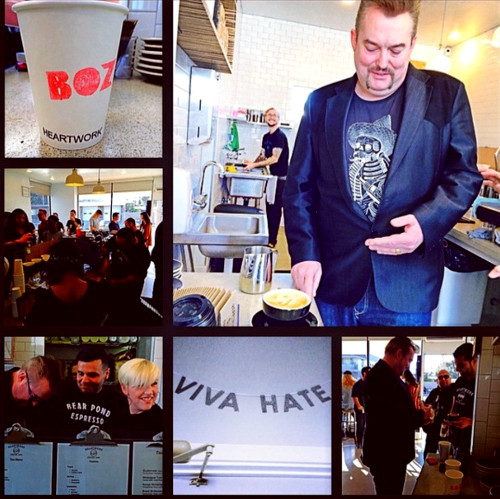
I also remember seeing something about you, Boz, Paul Cook (Sex Pistols), and Edwyn Collins (Orange Juice) working together on some music. You have to tell me more about that!
Chuck from Some Girls had been living in London for a few years, but was back in San Diego visiting family. He and I were discussing how much we missed playing music together and decided to write a couple songs. After emailing some ideas, we decided on two songs to try and record at the end of the Narrows tour in London. Boz and I had spoken briefly about recording together sometime, and he really liked what Chuck and I came up with and he said he would be in town the week I was there and was down to record.
Chuck was dating Paul Cook's daughter, Hollie, who is a super talented musician as well. Chuck had played Paul the songs and he was into it. Edwyn and his wife, Grace, own this sweet vintage studio in London. They offered their studio as a place for us to record the songs. Paul and Boz knew each other a bit from back in the day, so the energy just worked. Using vintage amps and recording equipment, we were able to get a very '70s, early Siouxsie Sioux kind of vibe to the two songs we recorded. We never got a vocalist, but hopefully one day it will see release. The session was Paul on drums, Chuck and Boz on guitars, and myself on bass. Edwyn helped the engineer a bit and just kind of hung out while we were there. Edwyn and his wife are just the loveliest people, and Paul was so fun to play with. If anything, it was just a really fun experience and it was so fun to play with my friend Chuck again.
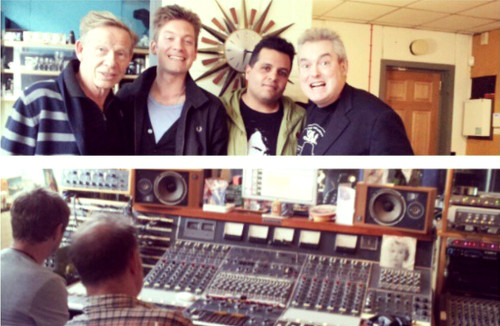
The last thing I wanted to ask you about was why you never started a Brit-flavored band. It seemed like a no-brainer for such an Anglophile.
I just never really thought about it until now, I guess. If anything, I think that because it's a no-brainer, people would expect that of me. Kind of like when I do a band, people expect Unbroken II, or like when Dave and I started Narrows, people wanted Botch II. I don't think I've done anything to reinvent myself in that way, but I feel that a lot of the music I've been involved with has always tried pushed forward with new takes within the genre of hardcore and punk. But as far as playing something distinctly Brit, I have no idea if and when it will ever happen. I just don't have the time right now, or the people to play it with.
I always sneer/snicker when people say, "I'm done with hardcore," or, "That was when I was young, it's kids stuff..." They always come back, always.
People are so quick to throw it away. I'm not saying you need to be some insane active person in "the scene," but don't dismiss it all either. Hardcore is very special for many reasons, and it should be treated as such.
I'm an adult with a fantastic wife, a great job, a lovely coffee shop, and a baby on the way. All of it in one way or another is connected to hardcore/punk, and I'm forever thankful.
***
Head to Three One G Records to buy the reissue of Unbroken's "And" b/w "Fall on Proverb" 7", and Heartwork Coffee Bar's official website to learn more about the shop.
Tagged: narrows, over my dead body, some girls, the vows, unbroken

